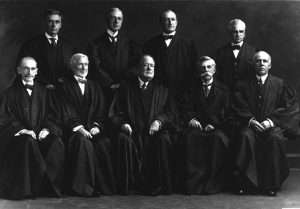The Volokh Conspiracy
Mostly law professors | Sometimes contrarian | Often libertarian | Always independent
Today in Supreme Court History: October 21, 1919
10/21/1919: Abrams v. United States argued.

Editor's Note: We invite comments and request that they be civil and on-topic. We do not moderate or assume any responsibility for comments, which are owned by the readers who post them. Comments do not represent the views of Reason.com or Reason Foundation. We reserve the right to delete any comment for any reason at any time. Comments may only be edited within 5 minutes of posting. Report abuses.
Please to post comments


RE: Abrams v. United States
Facts of the case
In 1918, the United States participated in a military operation on Russian soil against Germany after the Russian Revolution overthrew the tsarist regime. Russian immigrants in the US circulated literature calling for a general strike in ammunition plants to undermine the US war effort. The defendants were convicted for two leaflets thrown from a New York City window. One denounced the sending of American troops to Russia, and the second denounced the war and advocated for the cessation of the production of weapons to be used against "Workers Soviets of Russia". They were sentenced to 20 years in prison.
Question
Do the amendments to the Espionage Act or the application of those amendments in this case violate the free speech clause of the First Amendment?
Conclusion (7 - 2)
The Court held that in calling for a general strike and the curtailment of munitions production, the leaflets violated the Espionage Act. Congress’ determination that all such propaganda posed a danger to the war effort was sufficient to meet the standard set in Schenck v. United States for prosecuting attempted crimes. As in Schenck, the Court emphasized that protections on speech are lower during wartime.
In a dissenting opinion, Justice Oliver Wendell Holmes argued that the First Amendment protects the right to dissent from the government’s viewpoints and objectives. Protections on speech, he continued, should not be curtailed unless there is a present danger of immediate evil, or the defendant intends to create such a danger. The evidence in this case consisted of two leaflets, which he concluded did not meet the “clear and present danger” test. (Oyez)
I did a quick search to see if Abrams had been outright overturned.
It looks like in 1969, Abrams was largely overturned by Brandenburg v. Ohio which held that the government cannot punish inflammatory speech unless that speech is "directed to inciting or producing imminent lawless action and is likely to incite or produce such action."
Thanks!
Holmes was in the right for once. I believe the amendment (aka the Sedition Act) to the Espionage Act under which Abrams was convicted was repealed in 1921, though the Espionage Act itself lives on with various modifications.
Mireles v. Waco, 502 U.S. 9 (decided October 21, 1991): no judicial immunity for judge who ordered public defender seized and brought into courtroom when he failed to appear for a calendar call; ordering use of excessive force was acting outside judicial capacity (I suppose this means the police could have refused to obey the order?)
United States v. Michigan Nat'l Corp., 419 U.S. 1 (decided October 21, 1974): Government can bring antitrust suit against holding company creating "phantom" banks into which real bank assets would be merged, even though Comptroller of the Currency had yet to approve the mergers; Federal Reserve Board (the other necessary approver) had already approved it (!!), creating a case or controversy, and under statute the Gov't had only 30 days to sue
Tipton v. Socony Mobil Oil Co., 375 U.S. 34 (decided October 21, 1963): evidence that plaintiff had received longshoreman's benefits so as to prove that he was not a sailor (as required for his Jones Act personal injury suit) should not have been placed before the jury without a cautionary instruction as to narrow issue it was admitted for and instruction that it was not dispositive on that issue
The score in Mireles was 6 for summary reversal (this isn't The Blues Brothers), 1 for affirmance (ordering arrest is a judicial function), and 2 for pretending it never happened (denying cert).
Wait, that's backwards. The reversal was of the 9th Circuit decision against judicial immunity. So six approving "will no one rid me of that turbulent priest" and Stevens for "sue the robed bastard."
Sorry — should have corrected my comment before I posted it. The Court DID hold that there was judicial immunity.
Yeah, that sounded weird to me. Having read lots of cases on the subject (but not this one), "that's outside of judicial authority" did not seem like a winning argument here.
Did you learn anything about the subsequent history of the case? He also sued the officers who (allegedly) used ecessive force.
No, I didn't. Though a law review article puts in some details about what happened and it doesn't make the judge look good.
https://core.ac.uk/download/pdf/232781112.pdf